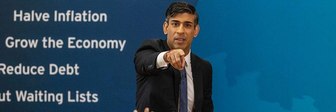Britons are split on whether the budget was fair or affordable, but tend to support individual measures announced
This week Jeremy Hunt delivered what should be his final budget ahead of a General Election, and a new YouGov survey for the Times looks into what the public think of the policies announced and the economy overall.
The most popular economic measures are freezing tax on petrol and diesel at their current level and introducing a new tax on vapes, with 73% and 72% saying each is a good idea, respectively. Britons are also in favour of increasing the threshold before losing entitlement to child benefit (64%), changing the non-dom tax rules (61%), and extending the oil and gas windfall tax (59%).
While there isn’t majority disapproval for any of the individual polices tested, the public are least supportive of a freeze on the tax on alcohol (43% good idea, 40% wrong priority) and maintaining the planned 1% increase in public spending (36% good idea, 27% wrong priority).
Support for NI reduction lower than in Autumn
Heavily hinted prior to the budget on Wednesday was a further reduction in employee National Insurance contributions, with the final announcement confirming the rate will drop from 10% to 8%. By 54% to 30% the public see this measure as a good idea, with those who voted Conservative in 2019 being much more likely to support the reduction (66% good idea, 24% wrong priority) than Labour voters (42% good idea, 42% wrong priority).
While just over half of the public are in favour of this policy, it has received less support than the previous National Insurance reduction which changed the rate from 12% to 10%. After this cut was announced in the Autumn statement last year, 61% thought this was a good idea while 24% saw it as the wrong priority.
Public split on whether the budget is fair and affordable
While individual measures have been viewed fairly positively, looking at the budget overall the public are split on whether it is fair (27%) or not (32%). This is a more pessimistic assessment than Hunt’s Autumn statement back in November which was viewed as fair by 38% to 23%.
Virtually the same split exists when it comes to affordability, with 28% saying they think these changes are affordable compared to 33% who think they aren’t. There is further pessimism about how these measures might impact people and their families. Just 10% of the public think the changes will make them better off, compared to one in five who think they’ll make them worse off. The majority (58%) feel the measures will make no difference either way.
The public are similarly gloomy about the state of the economy overall, with just 4% saying it’s in a good state compared to seven in ten 71% who say a bad state.
Chancellor’s personal approval drops to lowest level
Just 16% think Jeremy Hunt is doing a good job as Chancellor of the Exchequer, compared to 43% who think he is doing a bad job. Four in ten (41%) are unsure either way. Even amongst those who voted Conservative at the last election, opinion is split, with 31% thinking he’s doing well and 32% badly. This is his lowest approval rating of the four times we’ve asked this question immediately post-Budget/Autumn Statement. Back in November, 22% though he was doing well in the job, compared to 33% badly.
Public prefer Labour’s non-dom tax plan over Conservatives’
One of the announcements in the budget was abolishing the current "non-dom" tax regime, replacing it with a new scheme that requires people coming to the UK to pay tax on their foreign income after living here for four years.
The chancellor stated that the money saved would be used to reduce taxes and allow people to earn more money before losing child benefit. Labour had already said they planned to abolish the current "non-dom" tax regime if elected into Government, but would spend the money on NHS staff and free breakfast clubs at schools.
Asked which of the two policies they’d prefer, the public favour the Labour policy by 52% to 21%. The Labour Party option was chosen by three-quarters (73%) of those who voted for the party at the last election, and was also marginally more popular amongst those who voted Conservative (38% to 29%).
Photo: Getty











